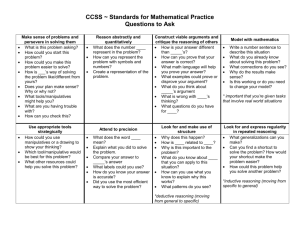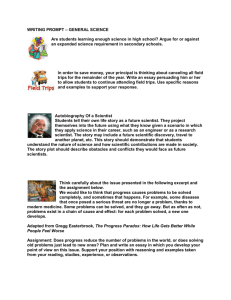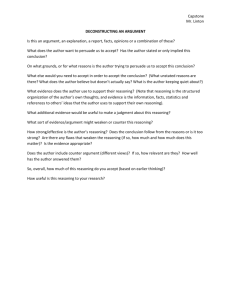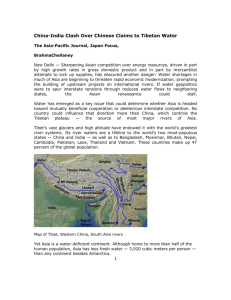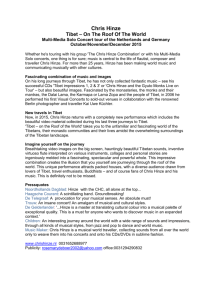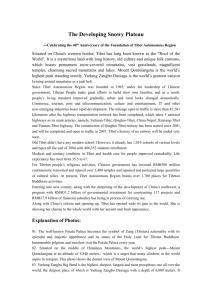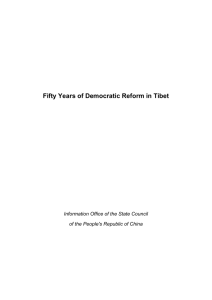liuliang done
advertisement
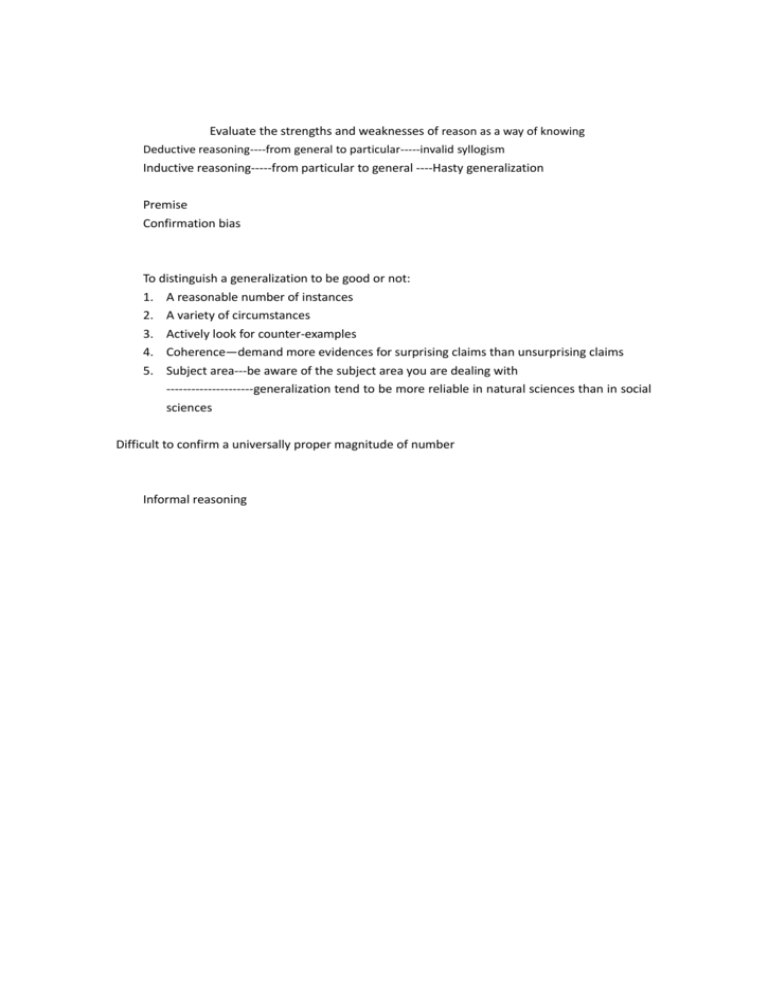
Evaluate the strengths and weaknesses of reason as a way of knowing Deductive reasoning----from general to particular-----invalid syllogism Inductive reasoning-----from particular to general ----Hasty generalization Premise Confirmation bias To distinguish a generalization to be good or not: 1. A reasonable number of instances 2. A variety of circumstances 3. Actively look for counter-examples 4. Coherence—demand more evidences for surprising claims than unsurprising claims 5. Subject area---be aware of the subject area you are dealing with ---------------------generalization tend to be more reliable in natural sciences than in social sciences Difficult to confirm a universally proper magnitude of number Informal reasoning Outline Prescribed title Evaluate the strengths and weaknesses of reason as a way a knowing\ Key words: strengths/ weaknesses/ reason/ knowing Ways of knowing: reason Areas of knowledge: history and science Supportive argument For history, the argument will be about “how do I Know if Tibet should be a part of China” For science, the argument will be about “How do I know the reliability of the conclusion for my Extended Essay which is in physic” Evaluate the strength and weakness of reason as a way of knowing Quite often we judge a person’s “quality” by seeing if he or she is logic or not. It might not be perfect method to judge people; however, it reflects the importance of being logic in the human society. As one of the most outstanding characters of reasoning, logic has made reason a very useful and popular method to know their surrounding world. On the other hand, reason is a process of getting conclusions from a proper number of information sources, that is to say, either the information sources or the way we reason out conclusions could both be affected by lots of outer factors. This would weaken us from approaching truth through reason as well. In this essay, strength and weakness of reason as a way of knowing will be discussed around the following three knowledge issues: How do I know if Tibet is a part of china? (History) How do I know the reliability of the conclusion for my Extended Essay which is in physics? The first time I was told about Tibet as “problem” being concerned was in the summer course last year. Before I came to Norway, I had never put a question on the Tibet being a part of China. The history books that all my classmates and I had used in school told us China and Tibet which were originally both independent countries have joined each other to be one part since Tang dynasty through loyal intermarriage. As sang by a song called “56 brothers, 56 flowers” which we would hear whenever there is a national celebration, Tibetans has been counted as one unique Chinese ethnic group with its other 55 brothers. I never heard from anybody around me talking about the independence of Tibet, neither did the public media such as TV or internet. As a result, I eventually reason out that Tibet being a province of China is just a fact. However, after coming to Norway, things became different. Just type “Tibet China independence” these three words, we can easily get 286,000 results. And we even have Tibetan refugee students from India, who are like somewhat much more persuading evidence concerning Tibet problem. Combined with this example, we can see the disadvantages to use reason as a way to search for “truth” in history. Due to its special position, history is usually bonded with political influence. That is to say, all the information that we have access to might not be reliable. Apart from bias problems from the premises, another weakness of using reasoning in history is that we usually make perception before reasoning out our conclusion. The Tibetan students and the Chinese students we had presentations during one World Today. When we searched for information for those presentations, the same thing we both did was that we just selected the information which was useful for us. Sometimes we were actually getting information from a same site (Wikipedia for instance), when we came across information which was against, we would just consider them wrong or ignore them. This prevented all of us take information from different sources, thus make it hardly impossible to accept views from each other (though not necessarily). I have been working on my EE in physics, in which I have been working on the relationship between the velocities of water and its depth. Firstly I did some research online first to find some relevant theory. Then one self-designed experiment was carried out experimentally. However, the experiment result didn't seem to match the theory completely. However, reasoning was proved to be a very useful tool for me to complete the essay. To get my conclusion, I considered a lot more different factors such as affect on velocity from surface tension, disturbance on measuring the depth of water from surface tension, range of frequency to generate the waves, reliability (limitation) of the apparatus that I was using, dependability of the method used to carry out the experiment, method that I used to analysis the data and so on, even though there was only one mentioned in the research question. I tried to collect as many factors as I can, so that I could do a numerous comparison between them. Then, some of them like a combination of depth of water and surface tension, limitation of apparatus tend to give better and outstanding explanations why some results didn't match theory. At the same time, some factors like disturbance on measuring the depth of water didn't seem to make a big difference. So I selected those which gave good explanations and discarded those which didn't seem to influence a lot on the result. And this selection made the analyzing process much easier. As I tried to select a number of possible factors, the conclusion tend to be much more reliable than just concerning the only factor---depth of water in my research question. On the other hand reasoning process is more persuading, especially when we present our conclusion or result to other people, they would be considered logical, thus more closer to “the truth” However, considering the reasoning process that I was using, it also implies some weakness which might prevent me from getting an appropriate conclusion. To reason out my conclusion, I need to collect and compare different factors first. However, the way I select those factors would be very much influenced by the information I had checked in advance. In fact, the factors that I put first to be discussed and had been focusing on are the factor listed on the websites I checked. That is to say, we often know the factors we would use before we actually select factors needed for reasoning. More briefly, that is to say the selecting of information is quite easily biased by our perception, which would make truth more difficult to be revealed. Then on the other hand, by the nature of reasoning, it seems the more factors to be counted, the more closely we can approach to “the truth”. When doing scientific research, we are likely to generalize some phenomenon before we have enough information. In the case of the experiment in my Extended Essay, I collected data for 25 times to get a conclusion. To evaluate the essay, this number would be one of the weaknesses for a good conclusion. For a more thorough theoretical investigation, this number would be suspected not enough as well. All in all, reason by its nature as a way of knowing is very outstanding because its being logical, and it has been using as an significant method for scientific research; however, the way we do the reasoning process will be easily disturbed by our perception, especially in some social science studies, perception sometimes can just make us hardly possible to make reasonable conclusions or understanding of opposite political positions by reasoning. Some questions: 1. Would you think the paragraphs for argument too big? Should I divide strengths and weakness into different paragraphs for each knowledge field? 2. Do you feel the argument expressed well enough for people to understand in terms of language and method? 3. What should I modify on the structure of the essay? ………………………………………….. 4. I am not sure if I deal the arguments well in terms of counterarguments..



